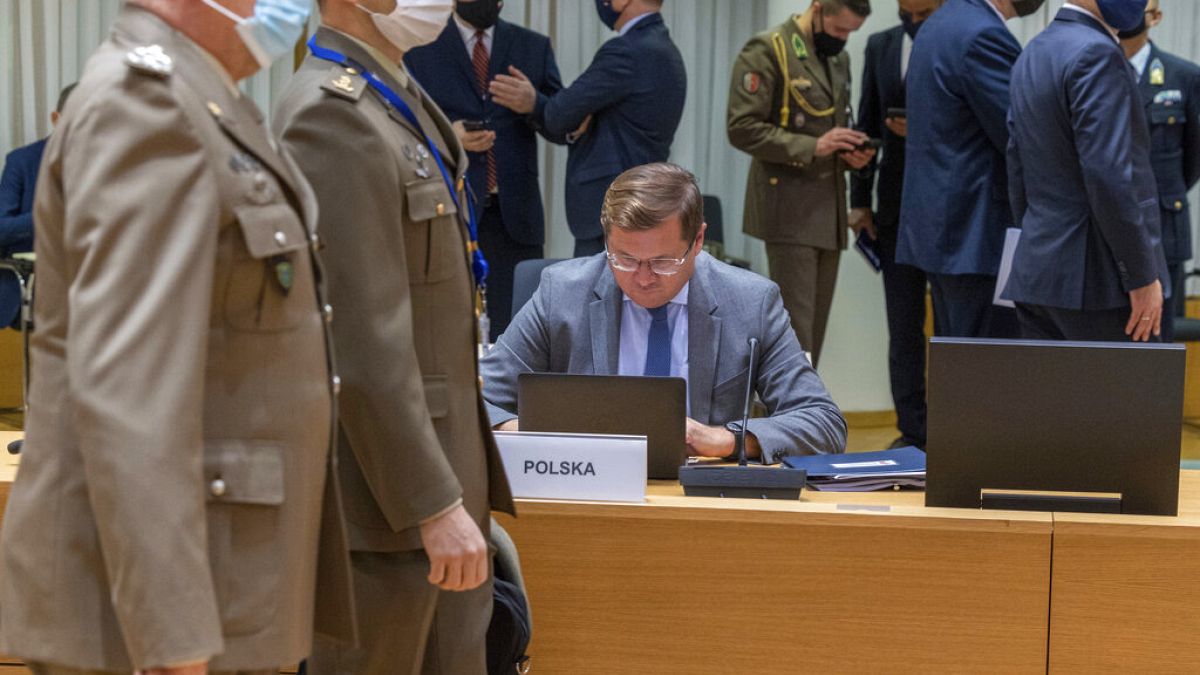The EU's new draft defence and security strategy is a lot less ambitious and more pragmatic than expected. As it should be, argues researcher Niklas Nováky.
The wait is over. After a year of preparatory discussions, the first draft of the EU’s 'Strategic Compass' -- or defence strategy -- document was presented to national ministers by the Union’s foreign policy chief Josep Borrell on November 15.
The aim of the Compass is to set new goals and targets for the development of the EU’s security and defence policy for the next five to 10 years.
Ahead of its presentation to the Council, the draft Compass was leaked to the media in what was arguably the most expected leak of the year in Brussels.
Journalists went through the document and provided overviews of the various proposals included. By the time the document was actually presented to national ministers, it seemed as if everyone in Brussels had already had a chance to go through it.
During the preparatory discussions, expectations arose that the European External Action Service (EEAS), which prepared the draft, would be putting forward a highly ambitious document (in anticipation that the overall level of ambition would then be watered down by the Council).
No new 'EU army' on the cards
Based on the content of the draft, however, this strategy seems to have been abandoned. It’s a fundamentally pragmatic document that seeks to build on existing EU initiatives, structures, and policies.
There are many proposals in the draft Compass. The one that’s received by far the most attention concerns the creation of a new modular EU Rapid Reaction Capacity (previously called the Initial Entry Force) of 5,000 troops equipped with the necessary enablers.
It was first proposed by a group of 14 EU countries in spring during the strategic dialogue phase, but it gained a new level of significance following the West’s chaotic withdrawal from Afghanistan in August.
The Rapid Reaction Capacity, if approved, would not be the ‘EU army’ some have written it would be. It would be slightly larger than the EU’s existing but never used, approximately 1,500-strong battle groups. But it could only be used if EU countries agree to it unanimously.
For historical context, it’s important to note that the EU has already led a military operation involving more than 5,000 troops.
When it was launched in 2004, the size of Operation Althea in Bosnia and Herzegovina was initially approximately 7,000 troops. The Rapid Reaction Capacity proposal, therefore, represents an evolution rather than a revolution.
Right move to keep inter-EU tensions low
This applies to the draft Compass more broadly as well. It seeks, first and foremost, to fine-tune and build on existing EU initiatives, structures, and policies in security and defence.
It wants inter alia to enhance the speed and flexibility of EU decision-making, to boost the Union’s ability to deter and counter cyber and hybrid threats, to guide its capability development processes, to increase engagement in regions such as the Indo-Pacific, and to strengthen the EU's dialogue with partners such as NATO and the US.
Although some EU countries would like the final Compass to be more ambitious than the draft, it was the right move from the EEAS at this stage.
Member states will only have four months to negotiate what stays in, what is added in, and what might be taken out from the draft before the final version is adopted in March 2022.
This isn’t a lot of time, so it makes sense to avoid anything ‘flashy’ and prevent unnecessary tensions between EU capitals ahead of the final talks.
If the level of ambition of the Compass is to be raised, the largest and most influential EU countries, especially France and Germany, must show political leadership in the coming months.
However, France is likely to be preoccupied by domestic politics during its Spring 2022 European Council Presidency due to the looming French presidential election, which puts a question mark over France’s ability to show leadership in EU affairs.
In addition, Germany still doesn’t have a new government. The next won’t have much time to familiarise itself with EU-level processes before it’s expected to be voting on the Compass's approval in the Council.
The new government must therefore be ready to jump straight into the deep end of the proverbial swimming pool. Much hinges upon the personal priorities of Olaf Scholz, the likely next Chancellor, and those of his foreign and defence ministers.
Fine-tuning needed ahead of final vote
There are ways in which the draft Compass could be improved. One would be to give greater attention to the need to enhance EU-level cooperation in security of supply, and in strategic stockpiling.
The draft document discusses security of supply only in very general terms, and there are no specific proposals that relate to it directly.
The final Compass could remedy this, for example, by laying out a roadmap for a dedicated EU strategy and proposing the creation of an EU security of supply agency, or centre of excellence.
Such steps would contribute to enhancing the Union’s resilience against sudden shocks and supply line disruptions, such as those caused by COVID-19 in 2020.
Overall, though, the draft Strategic Compass is already pointing in the right direction. The EEAS worked well in putting it together. For the next four months, it will be up to the member states to finetune and calibrate it.
Dr Niklas Nováky, Ph.D., is a senior research officer at the Wilfried Martens Centre for European Studies and author of the book European Union Military Operations: A Collective Action Perspective (Routledge, 2018).
